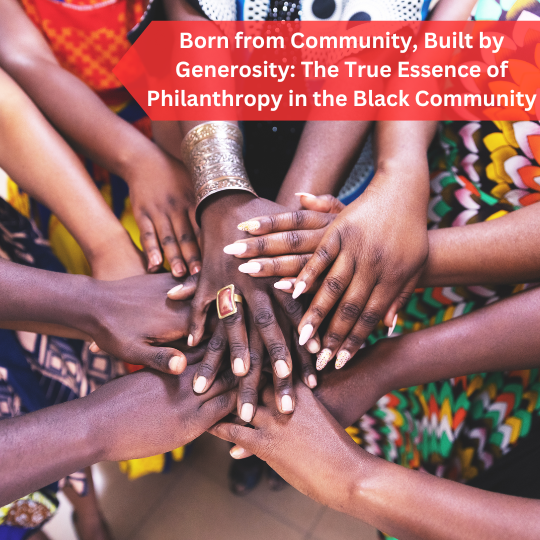Black Philanthropy is an enduring testament to the resilience, solidarity, and generosity of the Black community. It is a tradition deeply rooted in history, evolving from a means of survival to a powerful tool for empowerment and social change. As we approach Black Philanthropy Month in August, it is essential to reflect on this legacy of giving, celebrate its impact, and explore how we can continue to strengthen this tradition. This blog delves into the rich history of Black Philanthropy, highlighting its significance and offering insights on how we can build on this foundation for a brighter future.
Table of Content
- The Historical Roots of Black Philanthropy
- Ubuntu: The Pre-Slavery/Colonization Foundations of Black Philanthropy
- Survival and Solidarity: The Early Years of Slavery
- From Survival to Empowerment: The Transformation of Black Philanthropy
- Black Philanthropy Month: Celebrating a Legacy of Giving
- Modern-Day Black Philanthropy: Continuing the Tradition
- Key Takeaways from the Legacy of Giving
- Conclusion: Strengthening the Tradition of Black Philanthropy Today
1 -The Historical Roots of Black Philanthropy
The tradition of Black Philanthropy predates the horrors of slavery, with its roots deeply embedded in African cultural practices. Long before the transatlantic slave trade, African communities practiced Ubuntu—a philosophy and value system that emphasizes interconnectedness and mutual aid. Ubuntu, often translated as “I am because we are,” embodies the belief in a universal bond of sharing that connects all humanity. This foundational principle of humanity towards others set the stage for the enduring tradition of communal support and philanthropy within the Black community.
2 – Ubuntu: The Pre-Slavery/Colonization Foundations of Black Philanthropy
Ubuntu (Zulu pronunciation: [ùɓúntʼù]) describes a set of closely related African-origin value systems that emphasize the interconnectedness of individuals with their surrounding societal and physical worlds. In Zulu, “umuntu ngumuntu ngabantu” means “I am because you are,” capturing the essence of humanity’s interdependence. This philosophy fostered a culture of mutual support, where communities came together to ensure the well-being of all members. The spirit of Ubuntu laid the groundwork for the communal support systems that would later evolve into formal philanthropic efforts.
3 – Survival and Solidarity: The Early Years of Colonization & Slavery
With the onset of colonization and slavery around the world, the inherent sense of community and mutual aid became a critical survival mechanism. Enslaved Africans relied on these deeply ingrained cultural practices to support one another in the face of unimaginable adversity. They developed intricate networks of support, pooling resources to care for the sick, protect children, and provide for those in need. These acts of generosity were not merely charitable; they were essential for the community’s survival.
4 – From Survival to Empowerment: The Transformation of Black Philanthropy
As Black communities transitioned from slavery to freedom, the nature of Black Philanthropy evolved. The establishment of Black churches, schools, and mutual aid societies in the post-Civil War era marked a significant shift. These institutions became centers of community life, education, and social progress, supported by the collective efforts of Black philanthropists.
5 – Black Philanthropy Month: Celebrating a Legacy of Giving
Black Philanthropy Month (BPM), celebrated every August, honors this rich legacy of giving. BPM is a global celebration of Black generosity, highlighting the contributions of Black philanthropists and encouraging continued support for Black-led and Black-serving organizations. It is a time to recognize the impact of Black Philanthropy and inspire others to join this tradition.
6 – Modern-Day Black Philanthropy: Continuing the Tradition
Today, Black Philanthropy continues to thrive, driven by individuals and organizations committed to uplifting the Black community. From supporting educational initiatives to funding social justice movements, modern Black Philanthropy addresses various needs and challenges. Anick Silencieux, Founder of Support Black Charities, defines Black Philanthropy as “the intention of promoting the welfare, well-being, and elevation of the Black Community through financial contributions by supporting social, economic, and cultural initiatives that strengthen the Black Ecosystem.”
7 – Key Takeaways from the Legacy of Giving
- Resilience and Solidarity: Black Philanthropy has always been about resilience and solidarity. In times of hardship, the community has come together to support one another, ensuring collective survival and progress.
- Empowerment through Education: Education has been a central focus of Black Philanthropy. From funding schools in the Reconstruction era to supporting scholarships today, investing in education has been seen as a path to empowerment.
- Social Justice and Advocacy: Black Philanthropy has played a crucial role in advancing social justice. Philanthropists have supported civil rights movements, legal defense funds, and organizations fighting for equality and justice.
- Cultural Preservation and Promotion: Supporting cultural initiatives has been another vital aspect. Philanthropy has helped preserve Black heritage, celebrate Black culture, and promote artistic expressions.
8 – Conclusion: Strengthening the Tradition of Black Philanthropy Today
The legacy of Black Philanthropy is a powerful story of survival, solidarity, and empowerment. It has shaped the Black community through difficult times and moments of triumph. Today, we stand on the shoulders of those who came before us, and it is our responsibility to continue this tradition. By supporting Black-led and Black-serving organizations, promoting education, advocating for social justice, and celebrating our culture, we can ensure that the legacy of Black Philanthropy continues to thrive.
As we prepare for Black Philanthropy Month, let us honor this rich history and commit to building a future where the welfare and elevation of the Black community remain at the forefront. Together, we can make a lasting impact and strengthen the tradition of Black Philanthropy for generations to come.


